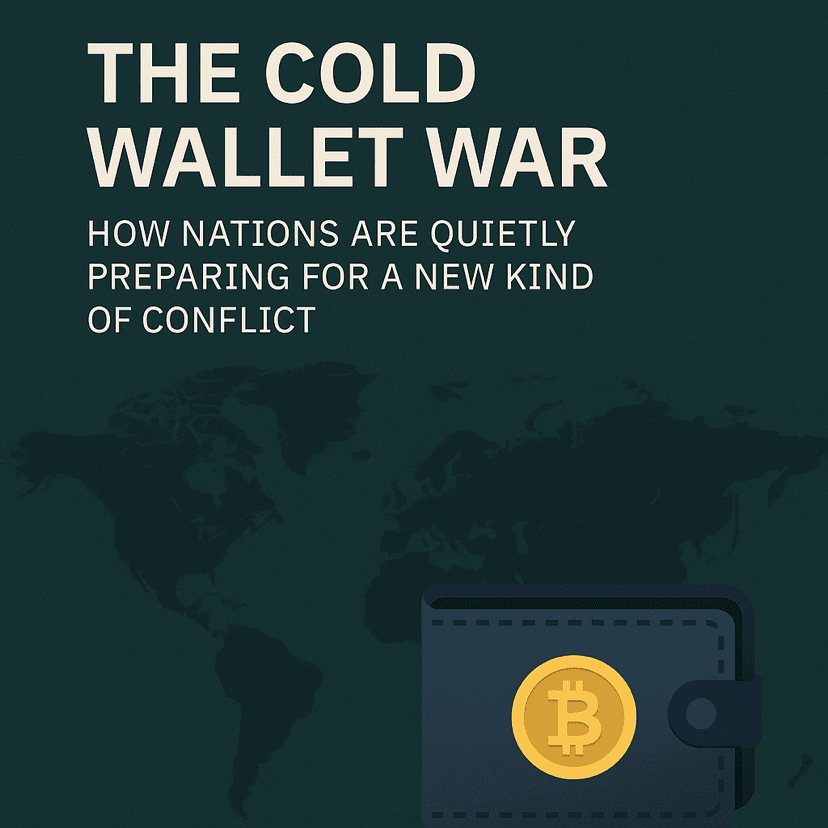A quiet race is underway. No sirens. No headlines. Just cold wallets — sealed, air-gapped, untouched. But not unnoticed.

🇺🇸 America’s Silent Declaration
It began not with a speech, but a silence.
On March 4, 2025, a new Executive Order appeared on the White House website. No press conference. No headlines. Just a file — EO 14099:“The Establishment of a Strategic Bitcoin Reserve.”
According to the directive, the U.S. Treasury is to consolidate all legally confiscated BTC into a national cold storage vault. It would be maintained offline, administered by a newly created digital asset unit — staffed by former cybersecurity analysts, blockchain forensic experts, and defense veterans.
The message wasn’t for the American public.
It was for other nations.
Because in an era where currency can be frozen and sanctions enforced at the speed of software, storing Bitcoin — unseizable, uncensorable — is more than fiscal policy.
It’s geostrategy.
⛰️ Bhutan: The Ghost Miner
While the world watched Wall Street and ETF filings, the Himalayan kingdom of Bhutan had already been mining Bitcoin — in secret, for years.
With abundant hydroelectric power and a population under 800,000, Bhutan quietly accumulated over $750 million in BTC through sovereign partnerships. That’s nearly 28% of its GDP — stored in addresses no mainstream economist talks about, routed through layers of offshore structures.
Why would a peaceful, landlocked nation need Bitcoin?
Because Bhutan understands what many don’t: dollar access is not a given, and the global monetary order is no longer immutable.
Bitcoin is their insurance policy — not against volatility, but against exclusion.
 💻 North Korea: The Hacker’s Reserve
💻 North Korea: The Hacker’s Reserve
In February 2025, over $1.5 billion in ETH was stolen from Bybit.
The attack left no trace except one signature: Lazarus Group — the state-sponsored cyber-arm of North Korea. Since 2021, they’ve drained over $3 billion in digital assets from global exchanges, with laundering routes spanning mixers, gaming assets, and DeFi protocols.
But intelligence reports suggest a darker strategy:
These aren’t just one-time heists. They’re state-funding operations — directly supporting Pyongyang’s nuclear and weapons programs.
And more chilling: a portion of these assets is being stored, not spent.
In cold wallets. Offline. Reserves.
🏯 The Accumulators Who Never Admit
Many governments denounce Bitcoin.
Few openly embrace it.
But more and more are quietly holding it.
🇨🇳 China officially banned crypto trading and mining. Yet after seizing 190,000 BTC from the PlusToken scam, it didn’t sell. It didn’t burn. It held. No movement in years. Just accumulation — the second largest sovereign stash after the U.S.
🇷🇺 Russia’s central bank calls Bitcoin “dangerous.”
But in private sessions, the Duma reviews plans to use BTC for energy trade with sanctioned nations — Iran, Venezuela, Turkey.
🇸🇦 Saudi Arabia has begun working with Gulf-based digital asset firms to explore BTC-backed sovereign contingency funds, creating a parallel track to traditional USD-denominated reserves. None of these nations declare Bitcoin publicly. But behind closed doors, the wallets don’t lie.
🧊 Deterrence by Design
During the Cold War, nuclear weapons weren’t used — they were stockpiled, quietly, to signal capability and prevent coercion. Bitcoin, in 2025, is playing the same role. It’s not about spending. It’s about signaling:
You can’t freeze our accounts.
You can’t cut off our liquidity
We operate outside your financial kill switch
Bitcoin is becoming the uranium of the digital economy. Held. Contained. Not to destabilize — but to neutralize threats. It is the ultimate non-compliant reserve asset.
⏳ The War Few Are Watching
This isn’t adoption.👺It’s preparation. Not for tomorrow — but for the storm already forming. There will be no summit to mark its start. No treaty to end it. Just countries with cold wallets. And countries without. Some will lose access to capital.
Some will lose influence.
Some will realize, too late, that they’ve lost the ability to opt out. And some — with no military, no oil, no soft power — will still win.